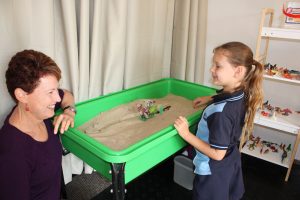How does therapy support children in working through their challenges?
Children and adults differ in how they work out solutions to their problems. As adults, we tend to think and talk to others to understand what has happened to us and to try and resolve our hurts.
 In comparison, children often need help to be able to understand what they are feeling and to put these feelings into words. The use of play enables this process, and also provides an unrestrained mode to work through their concerns. This is because children, especially those younger than eight years of age are still developing connections within their higher language areas associated with emotions, particularly negative emotional memories. Simultaneously children are also developing their own “schemas”, figuring out how they see the world, their relationships and themselves (their self-identity). So while it may be difficult for a child to verbalise what happened during a traumatic event e.g. when their parents were fighting or a particularly bad day with peers at school, given the appropriate play setting and the support of a trained therapist, children will utilize play to unfold the event. This play is akin to an adult thinking and gives the child an opportunity to begin to process happenings as well as providing a safe “language’ for communication.
In comparison, children often need help to be able to understand what they are feeling and to put these feelings into words. The use of play enables this process, and also provides an unrestrained mode to work through their concerns. This is because children, especially those younger than eight years of age are still developing connections within their higher language areas associated with emotions, particularly negative emotional memories. Simultaneously children are also developing their own “schemas”, figuring out how they see the world, their relationships and themselves (their self-identity). So while it may be difficult for a child to verbalise what happened during a traumatic event e.g. when their parents were fighting or a particularly bad day with peers at school, given the appropriate play setting and the support of a trained therapist, children will utilize play to unfold the event. This play is akin to an adult thinking and gives the child an opportunity to begin to process happenings as well as providing a safe “language’ for communication.